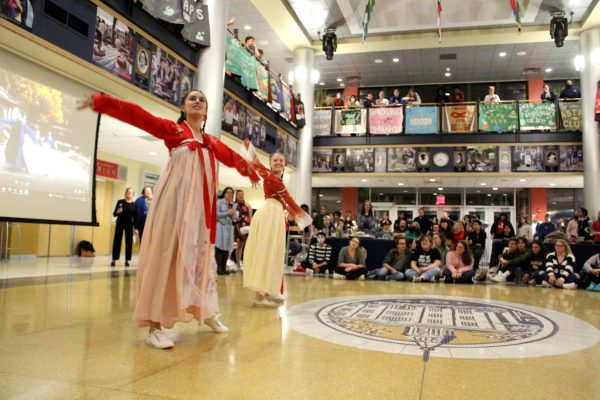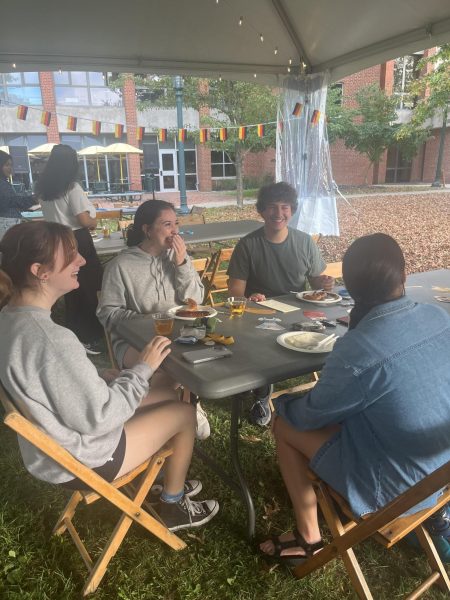Max Kade International House Spotlight: Chinese House
The Chinese House looks to enhance the learning community centered around a language and culture that originated 7,000 miles from Meadville, Pa.
“The reason we have Chinese House is [because] we wanted to have a specific location which we can speak Chinese every day, on a daily basis,” said Xiaoling Shi, associate professor of Chinese. “The benefit of it is you have a native speaker who has some formal training in Chinese teaching who can interact with you everyday and you can learn from her.”
The house is one of five language-based special interest houses in the Max Kade International Wing of North Village I. Shi said in the future, the Chinese program hopes to use the Chinese House not just as a place for its residents but as a resource for the entire campus.
“From this coming fall, we might want to use students who live in the Chinese House more to engage them into [the] Chinese learning community,” Shi said. “They have more responsibility, they engage more and they have more opportunity to practice.”
The Chinese program selects these engaged learners based on their applications, according to Shi, and they prefer to make residency in the Chinese House open to American students, so they might have the opportunity to better understand the language and culture.
The students who live in the house ideally bring with them varying levels of Chinese fluency and varying backgrounds, Shi said.
“So we would like to diversify it so each student bring in their unique perspective into the community so they can work together and work more efficiently and effectively. I think diversity is number two criteria,” Shi said.
Shi said the application essay is considered an important indicator of an applicant’s readiness to fit into the learning community and a willingness to contribute one’s unique abilities and perspective is essential.
Current Chinese House resident Christopher Miller, ’19, said he came to be a part of the Chinese community in an unconventional way.
“The summer of my freshman year, so after my first year, I decided ‘Hm. I’ve always liked Japanese and anime. I should take Japanese,’” Miller said. “So I went to look at the language programs and I was like ‘Oh, well that’s great. We don’t offer Japanese here.’ So I did some research and they’re pretty similar with their writing systems so I said ‘Okay, I’ll go and learn this.’”
Miller is now the president of the Chinese-American Friendship Society, and in addition to currently living in the Chinese House for the second year, he is attempting to go to Shanghai this summer.
Miller is just one example of the type of American student Chih-Jung Chen, Chinese teaching assistant, says is ideal for living in the Chinese House. This year, due to a lack of American student interest, three of the five residents are native speakers.
“I think the benefit of having two other native speakers is we will have more Chinese students coming during the weekend,” Chen said. “But I think the negative side of having native speakers, they have less time to practice what they learn in class.”
Next semester Chen said the Chinese House will be home to four American students. The only native speaker will be next year’s Chinese teaching assistant.
“I think that’s a better environment for students to learn,” Chen said.
Chen, who is originally from Taiwan, said Allegheny College was as foreign to her as Chinese is to many of her students. She finished a four-year degree in economics before realizing she wanted to pursue another career path and applied to a scholarship program that placed her at Allegheny.
“Before I came here, I had no idea, like, what is Meadville?” Chen said. “I didn’t even know what [a] liberal arts college [was]. We don’t have that in Taiwan. Everything is new here, but it’s kind of fun.”
Chen has already been a part of the changes being planned for the Chinese House during her year here.
Last year, the Chinese House residents began to work with the International Education Office by planning an event together, and they are continuing their collaborative work by hosting an open house with the other international houses in the international wing this semester. The members of the Chinese House will be teaching visitors how to make Chinese knots, a form of traditional decorative art.
Chen has also helped host a weekly tea hour and has challenged students to utilize their language ability by asking them to follow Chinese recipes. She said the experience has inspired her to further her education in applied linguistics with the goal of teaching Chinese one day.
In the meantime, Chen’s work and the experience of living in the Chinese House has already affected residents, Miller said.
“This might just be a lack of experience thing, but by living in the Chinese House, I really got to know that even though someone comes from a completely different country, different cultural background [and] completely different language, essentially they do the same things — play video games, eat, talk about girls,” Miller said. “People are people, and everyone deserves respect and attention.”






